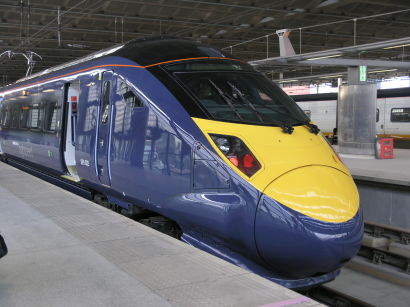SOUTHEASTERN has faced a storm of criticism from MPs, who are concerned about its recent performance figures as well as problems during the bad weather before Christmas.
Their concerns have been reinforced by the fact that Southeastern’s latest performance statistics were almost low enough to trigger compensation payments to thousands of season ticket holders – but not quite.
Like all train operators, Southeastern is only obliged to publish an average figure, but it’s being claimed this has allowed the comparatively reliable High Speed services to mask poorer performance on other routes.
One of Kent’s MPs, who took part in a Parliamentary debate on rail services in West Kent, described the standard of communication by both Southeastern and Southern during the recent bad weather as ‘abysmal’.
Conservative Sir John Stanley, who represents Tonbridge and Malling, told his fellow MPs: “The penalties regime is wholly unsatisfactory, because it impacts solely on lateness. One important question for the Minister on a specific issue: is she satisfied with the accuracy and independence of Southeastern's calculation? By the most wafer-thin of wafer-thin margins – 0.04 per cent – it has managed to escape financial penalties for lateness in its latest figures.”
His fellow Conservative Roger Gale, whose constituency is Thanet North, accused Southeastern of adjusting its figures to avoid paying out. He said: “Have the figures not been massaged by including the High Speed 1 service, which is normally fairly reliable? Were that taken out, the case for compensation would be overwhelming. Is it not a greater irony that if compensation were finally paid, the travellers on High Speed 1 would benefit from it?”
In reply, transport minister Theresa Villiers said that she had “urged the rail industry to consider how it assesses punctuality to ensure that it works on overall reliability as well as seeking to minimise cancellations and instances of significant lateness”.
A recent report by David Quarmby for the DfT has also criticised the standard of communication provided for rail passengers during periods of disruption, and Ms Villiers added: “His conclusions make it clearer than ever that rail operators and Network Rail must do much better on the provision of information to passengers about the new timetables imposed as a result of severe weather conditions. We are looking to the rail industry to respond to and learn lessons from what happened.”
By coincidence, in a report on the future of franchises published on the same day as the Commons debate, the Department for Transport said it was considering changing the rules on the amount of performance detail published by operators, so that ‘as a result, the differences between services will be far easier to identify’.
Meanwhile, Southeastern has already defended its performance calculations, which resulted in a figure of 82.04 per cent in the last operational period, saying that they had been drawn up according to industry standards, independently audited and verified by the Department for Transport.
A spokesman for the company added: “Each weekday we operate 2,100 services with only 150 of them being High Speed, so while of course they will contribute to the overall statistics the weight given to them is proportionate. As our services are integrated – for example all passengers can use High Speed services at no extra cost when not on High Speed 1 – we report the Mainline and High Speed services as one figure.
“Contingency timetables are only introduced when we are instructed by Network Rail, which is responsible for the infrastructure and what services we can run.”
Southeastern, which is owned by Govia, is also waiting to see if its franchise will be extended for another two years.
At the moment, its contract is due to end on 31 March 2012, but Ms Villiers said on 20 December that a review of Southeastern had just ended, and that a decision about the extension could be expected ‘early in the new year’.
Southeastern under fire from MPs over performance
20th January 2011


